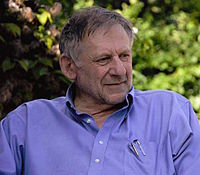| Christopher Alexander
|
 Christopher Alexander Christopher Alexander |
| Nascimento
|
4 de outubro de 1936
Viena
|
| Morte
|
17 de março de 2022 (85 anos)
Binsted
|
| Residência
|
Chichester, Oxford, Berkeley, Binsted
|
| Nacionalidade
|
austríaco
|
| Cidadania
|
Estados Unidos, Reino Unido
|
| Progenitores
|
- Ferdinand Johann Alfred Alexander
- Lilly Edith Elizabeth Alexander
|
| Cônjuge
|
Margaret Moore Alexander
|
| Filho(a)(s)
|
Sophie, Lily
|
| Alma mater
|
|
| Ocupação
|
arquiteto, teórico da arquitetura, professor universitário, teórico da arte, urbanista
|
| Distinções
|
- Vincent Scully Prize
- Membro da Academia Americana de Artes e Ciências
- Global Award for Sustainable Architecture (2014)
- honorary doctorate of Hasselt University (2008)
|
| Empregador(a)
|
Universidade da Califórnia em Berkeley, Instituto de Tecnologia de Massachusetts
|
| Campo(s)
|
Arquitetura
|
|
|
Cristopher Alexander (Viena, 4 de outubro de 1936 – Binstead, 17 de março de 2022) foi um arquiteto, matemático e urbanista austríaco. Era professor emérito da Universidade da Califórnia em Berkeley. Foi um dos críticos da arquitetura moderna apontando a desagregação social causada por ela. Seus estudos contribuíram para a utilização de padrões geométricos e matemáticos no urbanismo e arquitetura.
Faleceu na Inglaterra em 17 de março de 2022.[1]
Obras representativas
- West Dean Visitors Centre (Sussex)
- Community Mental Health Center (California)
- Plan for Chikusadai (Nagoya)
- Campus de la New Eishin University (Tokyo)
- Agate Street dormitory (Oregon)
- Casa Sullivan (California)
- Casa Upham (California)
- Casa Martínez (California)
- El plan Shiratori (Nagoya)
- Julian Street Inn (California)
Trabalhos publicados
As obras publicadas de Alexander incluem:
- Community and Privacy, com Serge Chermayeff (1963)
- Notes on the Synthesis of Form (1964)
- A City is Not a Tree (1965)
- The Atoms of Environmental Structure (1967)
- A Pattern Language which Generates Multi-service Centers, com Ishikawa e Silverstein (1968)
- Houses Generated by Patterns (1969)
- The Grass Roots Housing Process (1973)
- The Center for Environmental Structure Series, composta de
- The Oregon Experiment (1975)
- A Pattern Language, com Ishikawa e Silverstein (1977)
- The Timeless Way of Building (1979)
- The Linz Cafe (1981)
- The Production of Houses, com Davis, Martinez, and Corner (1985)
- A New Theory of Urban Design, com Neis, Anninou, e King (1987)
- Foreshadowing of 21st Century Art: The Color and Geometry of Very Early Turkish Carpets (1993)
- The Mary Rose Museum, with Black and Tsutsui (1995)
- The Nature of Order Book 1: The Phenomenon of Life (2002)
- The Nature of Order Book 2: The Process of Creating Life (2002)
- The Nature of Order Book 3: A Vision of a Living World (2005)
- The Nature of Order Book 4: The Luminous Ground (2004)
- The Battle for the Life and Beauty of the Earth: A Struggle between Two World-Systems, com HansJoachim Neis e Maggie More Alexander (2012)
Não publicado:[2]
- Sustainability and Morphogenesis (working title)
Referências
Ligações externas
 Wikiquote
Wikiquote